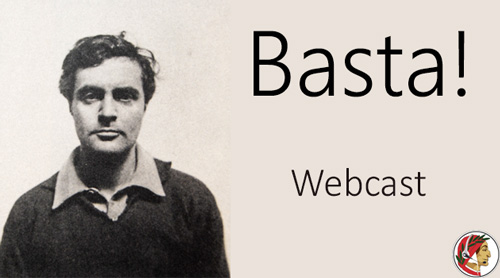The Italian word “basta” means a lot of different things . Examples and premium webcast.
La parola italiana basta, significa molto più di no more o enough.
I’m going to mix Italian and English in this blog. If you like this new approach, or if you find it confusing, please let me know. All the examples are going to be only in Italian. The audio samples too.
In base a come la usiamo, la parola italiana basta può avere significati differenti. Il più ovvio è “to be enough”.
Depending on how we use it, the Italian word “basta” can have different meanings. The most obvious is “to be enough”.
-
Vuoi ancora un po’ di vino o basta così?
In questo caso, basta viene dal verbo impersonale bastare, di cui abbiamo già parlato in un altro blog.
Il vino basta? È abbastanza? Do you want some more wine? Is it enough? More examples with different tenses.
-
Basteranno questi soldi per fare la spesa?
-
Vorrei studiare di più l’italiano ma il tempo non mi basta mai.
-
Per cuocere bene il pollo basterebbero ancora dieci minuti.
Un altro significato interessante è come “no more…” o “enough with…” seguito da un verbo (stop doing this…) o da un oggetto (enough with this…).
-
Mario, basta con la Play Station, devi fare i compiti.
Enough, no more videogames.
Some more examples. Listen carefully.
-
Basta fumare, ti fa male.
-
Lavori troppo. Devi avere il coraggio di dire “basta”.
-
Basta con questi film violenti. Che ne dici di una commedia?
So, if we have basta with a verb, we have something close to “stop +…ing”. Stop smoking, it’s bad for your health. In Italian we use the infinitive. Basta fumare!
Un altro uso importante di questa parola molto versatile, è simile all’inglese “that’s it” o “it’s just…”. Nothing more than…
-
Laura è una collega e basta. Non ci vediamo mai fuori dall’ufficio.
Laura is just a colleague, we never hang out together.
-
Ho una fame da lupi. A pranzo ho mangiato una mela e basta.
-
Avete dieci minuti per completare l’esame e poi basta.
-
Domani mi sveglio presto. Stasera guardo un po’ di tivù e basta.
Quindi possiamo dire che “e basta” assomiglia a “and that’s it”.
Un’ultimo uso di cui vi voglio parlare è “basta che…” = ” as long as…”. In questo caso, è molto comune l’utilizzo del conguintivo perché esprimiamo una condizione e il verbo impersonale bastare si connette a un soggetto differente nella seconda frase. Difficile? Non proprio. Guardate gli esempi.
So, this one is a bit of advanced grammar. “Basta che…” triggers the subjunctive, il congiuntivo, because we have a condition (as long as…), we have a “che” used to connect two sentences and we have two different subjects. Sounds difficult but actually it is not. If you have questions about the examples, feel free to ask me, or your teacher, during your classes.
-
Potete giocare a calcio in cortile, basta che stiate attenti a non calpestare i fiori.
-
Ti accompagnerò al supermercato, basta che non ci mettiamo troppo tempo.
-
Va bene, gli presterò la mia macchina. Basta che mi ci metta la benzina.
Basta così! That’s it for today. There are other nuances and situations where the Italian word basta is appropriate. Ricordate che potete imparare l’italiano; basta studiare, parlare e praticare. Alla prossima.
Fotografia: Amedeo Modigliani, fatta a Nizza, Francia, nel 1918 dopo avere perso tutti i documenti.


